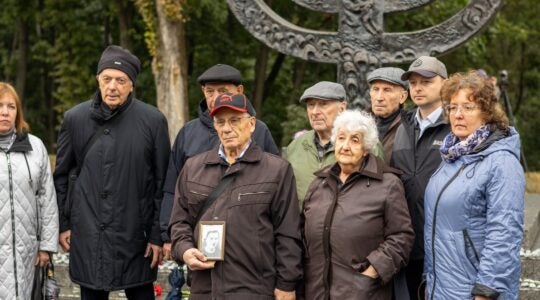WARSAW (JTA) — Piotr Kadlcik, president of the Union of Jewish Religious Communities in Poland, disputed allegations of mismanagement of property from prewar Jewish communities.
The statement issued Tuesday took to task the allegations made last month in the Polish edition of Forbes magazine.
The Forbes report comprised several articles that targeted the leaders of Poland’s organized Jewish community along with the Foundation for the Preservation of Jewish Heritage in Poland, or FODZ, the World Jewish Congress and the World Jewish Restitution Organization.
One of the articles described Kadlcik as one who “likes a drink or many and can often be seen on the street trying to find his bearings.” It called Poland’s chief rabbi, Michael Schudrich, “the perfect rabbi to foster corruption.”
Another article accused Monika Krawczyk, CEO of the Foundation for the Preservation of Jewish Heritage in Poland, as “charged by her employers, the largest Jewish world organizations, with selling and liquidating as fast as feasible the half of the restituted communal property she controls on behalf of those organizations, and with transferring the moneys to their bank accounts for further waste … to hell with Polish Jews!”
In response to the accusation that the Jewish community sold part of the cemetery in Torun in northern Poland to a developer, Kadlcik wrote in a statement issued Tuesday, “This took place in 1993 when the owner and sole administrator of the property was the City of Torun.” He also explained that some buildings, such as the former Jewish hospital in Siedlce, that are not listed on the national heritage registry and are in bad condition are very difficult to preserve.
“After taking possession of the real estate, the Community tried to lease the property or find an investor for it but was unsuccessful,” he wrote.
This was also true of the beit midrash in Sokolow Podlaski, located about 50 miles east of Warsaw and home to a large Jewish population before World War II. The building, which was rebuilt during the communist period, was recovered in 1999 and sold in 2000.
“It was stripped of all signs that it had once been a place of prayer. Among the main reasons for the building’s sale were its technical state, its distance from the headquarters of the Community and the two families living on the site who were causing problems and not paying their rent,” according to Kadlcik.
Kadlcik refutes all the allegations in his statement posted on his blog on the Jewish community’s website, where he says he is going to publish further responses to other articles on the subject. In reference to the personal attacks on himself and others, Kadlcik said “all those are epithets which will see their day in court.”
Seweryn Aszkenazy of the Beit Warszawa Foundation at a news conference on Wednesday challenged journalists to find irregularities in the Jewish community.
JTA has documented Jewish history in real-time for over a century. Keep our journalism strong by joining us in supporting independent, award-winning reporting.





